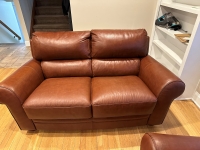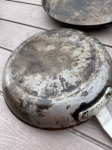Boilers and Water Heaters
Via a gas generator, I would imagine? But I am far from an expert. Plumbers and electricians would all know the answer, I inagine.
Our hot water heater works without electrical power. Our old boiler also worked without electricity. About two years ago we replaced our boiler. Our plumber told us that we could not have the same setup due to current safety regulations. I believe our old boiler setup was a millivolt. Hopefully one of the plumbers here on MOL can explain what a millivolt is and why it is no longer permissible.
https://www.absolutaire.com/sites/default/files/public/documents/101719.pdf
Our old water heater worked without power. That was the one luxury we had during Sandy, long hot showers. But then it died and I'm not sure if they don't make them with pilot lights any longer, or if they just very hard to find. But basically now if we lose power we no longer have hot water.
Our cooking stove is gas, but even with the piezoelectric ignition we were able to use it, we just kept a box of matches by the stove.
We've only had to dump an entire fridge's worth of food twice in the 15 years we've been here, but it still hurts watching all that $$$ and wasted food go into the trash. We ended up buying a used generator on Swap Meet. Even if we end up never using it until the day we die, I'll be happy. It's kind of like insurance, something you buy that you also hope you never actually need to use.
Our old water heater worked when we lost power, but our steam boiler did not. When we got a new water heater some years later, the plumber told us that the new models won't work without power. Not sure why.
Many old discussions answer questions of OP.
Here are just 2; there may be better ones out there, both from Sandy and the prior Halloween snowstorm (which brought down more trees than Sandy did here).
unicorn33 said:
Our old water heater worked when we lost power, but our steam boiler did not. When we got a new water heater some years later, the plumber told us that the new models won't work without power. Not sure why.
Piezoelectric. The old ones had pilot lights.
spontaneous said:
unicorn33 said:
Our old water heater worked when we lost power, but our steam boiler did not. When we got a new water heater some years later, the plumber told us that the new models won't work without power. Not sure why.
Piezoelectric. The old ones had pilot lights.
We replaced our steam boiler about 15 years ago and were told the same thing then - no permissable technology that didn't require electricity (for the ignition.) However, we replaced our water heater just three years ago and it still has a pilot light. I'm not sure why the difference.
FilmCarp said:
Your boiler needs electrical power to power the thermostat.
On my earlier gas boiler (purchased/installed around 1990 in our previous Maplewood home), we had a millivolt thermostat that got its power somehow from the pilot light. No electrical hookup required and it ran just fine when power was out. But that setup - something about pilot lights and/or millivolt thermostats - has since been disallowed for new installations according to code. I don't really understand why, especially when hot water heaters can have pilot lights. What's the difference?
When we moved to our current home in 1994, it had oil heat which certainly DID require electricity to run the pump that brought the oil out of the tank. But when we converted to gas in about 2000, we were looking forward to going back to the millivolt thermostat and no electricity requirement for heating. We were NOT happy campers when we learned that was no longer allowed.
millivolt is exactly what a thermocouple uses -- the heat from the pilot light heats a metal inside the thermocouple to generate a tiny current which then turns on the gas valve.
In the name of better energy efficiency, furnaces, boilers, etc. have gone away from standing pilot lights -- and so no pilot means no millivolt system to control the boiler.
peteglider said:
millivolt is exactly what a thermocouple uses -- the heat from the pilot light heats a metal inside the thermocouple to generate a tiny current which then turns on the gas valve.
In the name of better energy efficiency, furnaces, boilers, etc. have gone away from standing pilot lights -- and so no pilot means no millivolt system to control the boiler.
Maybe when they changed the code, they should have come up with a battery backup requirement or some other method to maintain independence from the electric power requirement. Loss of heat is a major hazard of power failures. If it is cold outside, I can put the contents of my fridge in a cooler on my porch and I can live without my laundry machines and dishwasher. But heat can be vital and generators have their own issues (and seem like overkill for an electricity need that is so low voltage-wise.)
Yea, but it’s not just power to control the flow of gas or oil. Furnaces have blowers, hot wAter boilers have pumps, and many flues have electric powered dampers. And there are often other electrically controlled zone controls
sac said:
peteglider said:
millivolt is exactly what a thermocouple uses -- the heat from the pilot light heats a metal inside the thermocouple to generate a tiny current which then turns on the gas valve.
In the name of better energy efficiency, furnaces, boilers, etc. have gone away from standing pilot lights -- and so no pilot means no millivolt system to control the boiler.
Maybe when they changed the code, they should have come up with a battery backup requirement or some other method to maintain independence from the electric power requirement. Loss of heat is a major hazard of power failures. If it is cold outside, I can put the contents of my fridge in a cooler on my porch and I can live without my laundry machines and dishwasher. But heat can be vital and generators have their own issues (and seem like overkill for an electricity need that is so low voltage-wise.)
I remember when the MOL plumbers started warning about the new regulations for water heaters. I got mine replaced in time with one that still has a pilot light. I seriously considered buying a spare for future replacement and still kind of regret not doing it. Life without electricity is a lot better if you’ve got hot water.
I think water heaters still have pilot lights. I put one in in December.
peteglider said:
Yea, but it’s not just power to control the flow of gas or oil. Furnaces have blowers, hot wAter boilers have pumps, and many flues have electric powered dampers. And there are often other electrically controlled zone controls
sac said:
peteglider said:
millivolt is exactly what a thermocouple uses -- the heat from the pilot light heats a metal inside the thermocouple to generate a tiny current which then turns on the gas valve.
In the name of better energy efficiency, furnaces, boilers, etc. have gone away from standing pilot lights -- and so no pilot means no millivolt system to control the boiler.
Maybe when they changed the code, they should have come up with a battery backup requirement or some other method to maintain independence from the electric power requirement. Loss of heat is a major hazard of power failures. If it is cold outside, I can put the contents of my fridge in a cooler on my porch and I can live without my laundry machines and dishwasher. But heat can be vital and generators have their own issues (and seem like overkill for an electricity need that is so low voltage-wise.)
I get that, but for gas-powered steam systems (which predominate around here), that is usually NOT the case and it is disappointing that they couldn't have dealt with that when implementing a standard that added dependence on the aging power grid.
I get what you are saying, sac, but I disagree. Boilers already have too many add on parts for plumbers to deal with in the field. Water cutoffs don't seem to come with the boiler, there are different brands and they are installed on site. Same with other parts. I really want my plumber to focus on the plumbing. If I want to add a battery backup or transfer switch I'll do that separately. Really, the simplest although illegal thing is to put a plug on the whip from the boiler and a receptacle in the box it ties into. If there is an outage unplug the boiler and plug it into a generator outside.
Featured Events
-
Stephen Whitty Presents - Hometown Movie Stars: The Celebrated Actors Of CHS
May 6, 2024 at 7:00pm
For Sale
-
leather couches $300
More info
Garage Sales
-
Multi Family Garage Sale Sale Date: Apr 20, 2024
More info




























With all the power outages I was wondering if there is a way to operate the boiler and/or the water heater when there is no electricity?